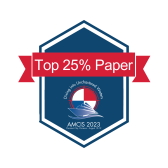Loading...
Paper Type
Complete
Description
To cope with climate change, an effective reduction of greenhouse gas (GHG) emissions is necessary. An acceleration of decarbonization still lacks an efficient way to precisely account GHG emissions. Recent literature acknowledges the role of Information Systems (IS) research, particularly Green IS, to contribute to decarbonization by enabling digital carbon accounting (CA). In this context, various scholars set out to design system architectures – often focusing on the energy sector due to its large potential for decarbonization. As research and practice lack a comprehensive overview (e.g., to develop standards), our work aims at reducing this identified gap by providing key characteristics of digital CA system architectures that we derive from an extensive, structured literature review and a consecutive deductive and descriptive approach. We argue that a stronger focus on both, user and identity management and interoperable registries, may be beneficial to foster digital CA.
Paper Number
1197
Recommended Citation
Körner, Marc-Fabian; Schober, Marcus; Ströher, Tobias; and Strüker, Jens, "Digital Carbon Accounting for Accelerating Decarbonization: Characteristics of IS-Enabled System Architectures" (2023). AMCIS 2023 Proceedings. 2.
https://aisel.aisnet.org/amcis2023/sig_green/sig_green/2
Digital Carbon Accounting for Accelerating Decarbonization: Characteristics of IS-Enabled System Architectures
To cope with climate change, an effective reduction of greenhouse gas (GHG) emissions is necessary. An acceleration of decarbonization still lacks an efficient way to precisely account GHG emissions. Recent literature acknowledges the role of Information Systems (IS) research, particularly Green IS, to contribute to decarbonization by enabling digital carbon accounting (CA). In this context, various scholars set out to design system architectures – often focusing on the energy sector due to its large potential for decarbonization. As research and practice lack a comprehensive overview (e.g., to develop standards), our work aims at reducing this identified gap by providing key characteristics of digital CA system architectures that we derive from an extensive, structured literature review and a consecutive deductive and descriptive approach. We argue that a stronger focus on both, user and identity management and interoperable registries, may be beneficial to foster digital CA.
When commenting on articles, please be friendly, welcoming, respectful and abide by the AIS eLibrary Discussion Thread Code of Conduct posted here.




Comments
SIG Green